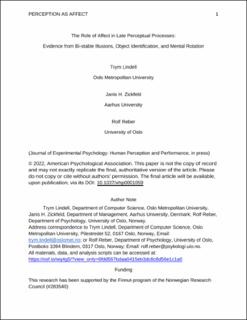| dc.contributor.author | Lindell, Trym | |
| dc.contributor.author | Zickfeld, Janis Heinrich | |
| dc.contributor.author | Reber, Rolf | |
| dc.date.accessioned | 2022-10-03T11:16:23Z | |
| dc.date.available | 2022-10-03T11:16:23Z | |
| dc.date.created | 2022-08-15T23:02:28Z | |
| dc.date.issued | 2022-09-22 | |
| dc.identifier.issn | 0096-1523 | |
| dc.identifier.issn | 1939-1277 | |
| dc.identifier.uri | https://hdl.handle.net/11250/3023330 | |
| dc.description.abstract | Computational views of perception do not consider affect to be required to solve a perceptual task. Previous research provided evidence for an affective component in early perceptual processes but it is unclear whether late perceptual processes yield concomitant affect. Three studies using three different tasks explored changes in affect related to late perceptual processes by exposing participants to a visual object and measuring activity in facial muscles (zygomaticus major and corrugator supercilii) using facial EMG as indicators for affect. In the first task, change of muscle activity was measured before and after participants indicated that the perspective of bi-stable illusions shifted. In the second task, change of muscle activity was measured before and after participants indicated that they identified an object that emerged from a pattern mask. The third task examined the affective consequences, as measured by facial EMG, of solving mental rotation tasks. The three studies found that shifts in bi-stable illusions, identification of objects, and solving mental rotation problems yielded increasing zygomaticus major activity, indicating increased positive affect after task completion. Simultaneously, corrugator supercilii activity decreased after successful perception. These studies suggest that success in perception is inherently affective, even when memory, comparison, and decision processes are involved. | en_US |
| dc.description.sponsorship | This research has been supported by the Finnut-program of the Norwegian Research Council (#283540). | en_US |
| dc.language.iso | eng | en_US |
| dc.publisher | American Psychological Association | en_US |
| dc.relation.ispartofseries | Journal of Experimental Psychology: Human Perception and Performance; | |
| dc.subject | Bi-stable illusions | en_US |
| dc.subject | Object identification | en_US |
| dc.subject | Mental rotation | en_US |
| dc.subject | Positive affect | en_US |
| dc.subject | Facial electromyography | en_US |
| dc.subject | fEMG | en_US |
| dc.subject | Disambiguation | en_US |
| dc.title | The Role of Affect in Late Perceptual Processes: Evidence from Bi-stable Illusions, Object Identification, and Mental Rotation | en_US |
| dc.type | Peer reviewed | en_US |
| dc.type | Journal article | en_US |
| dc.description.version | acceptedVersion | en_US |
| dc.rights.holder | © 2022, American Psychological Association | en_US |
| cristin.ispublished | false | |
| cristin.fulltext | postprint | |
| cristin.qualitycode | 2 | |
| dc.identifier.doi | https://doi.org/10.1037/xhp0001059 | |
| dc.identifier.cristin | 2043228 | |
| dc.source.journal | Journal of Experimental Psychology: Human Perception and Performance | en_US |
| dc.source.pagenumber | 52 | en_US |
| dc.relation.project | Norges forskningsråd: 283540 | en_US |
